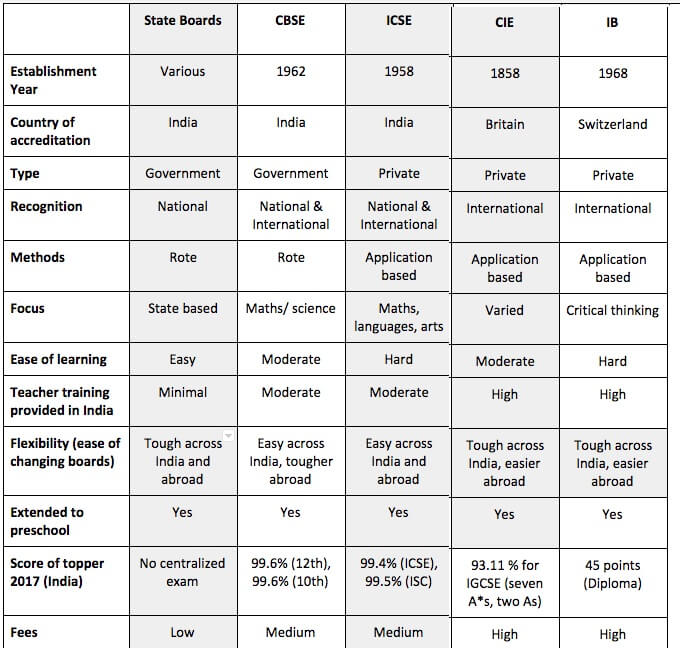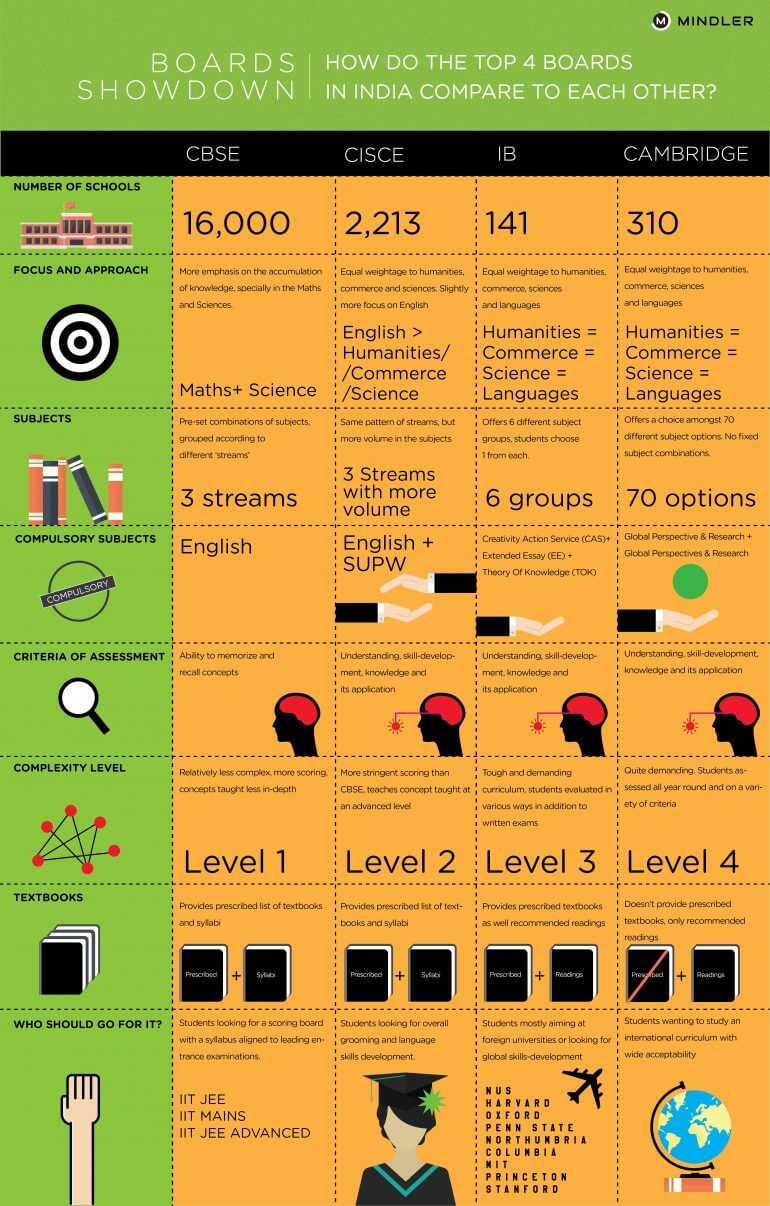Today, parents have many school boards to choose for their child, CBSE, ICSE, State Board, IGCSE, IB. Parents feel that they have to select the school properly as education is the ticket to a better life for most of us. What are the school boards available in India? Explore IB and IGCSE in detail. Compare the various boards, Talk about the documentary 2 million minutes to prepare for college and ultimately a career. Does Board matter?
Table of Contents
School Boards in India
India is structured with three domestic education boards – CBSE, CISCE (ICSE, ISC) & State Boards and two international education boards – IGCSE & IB. Indian Schools offer both Indian and International Syllabi. Each board is unique from the point of view of their functionality, curriculum, abilities and standards.
2 Million Minutes is a series of documentary films produced in 2008-2009 exploring how students in the United States, India, and the People’s Republic of China spend the nominal 2,000,000 minutes of their high school years. You can read about 2 million minutes here .
- CBSE (Central Board of Secondary Education):
-
A Board which follows universal pattern is the first choice for parents with transferable jobs.
-
CBSE affiliates all Kendriya Vidyalayas, all Jawahar Navodaya Vidyalayas, private schools, and most of the schools approved by central government of India and 25 Countries including India, Malaysia, Dubai etc
- CBSE conducts two main examinations – All India Secondary School Examination (AISSE) in Grade-X and All India Senior School Certificate Examination (AISSCE) in Grade – XII.
- Students aiming at pursuing a career in Engineering or Medical prefer this board, as the syllabi and pattern of Indian entrance examinations in these two domains are aligned to the CBSE curriculum
-
- CISCE (Council for the Indian School Certificate Examinations):
- a non-government, private board conducts 2 exams, ICSE (Indian Certificate of Secondary Education) for Grade X and ISC (Indian School Certificate) for Grade XII
- board of choice for students aiming at pursuing careers in the fields of Humanities and Management, as the CISCE syllabus is more oriented toward these streams and helps in the development of excellent language skills.
- Students looking for overall grooming and development prefer this board over CBSE.
- State Board (State Government Recognized Board)
-
Every State Government imparts Primary, Secondary and Higher Secondary Education in its respective state.
-
Examination Pattern, SSC: Secondary School Certificate, 10 Board Exams, HSC: Higher School Certificate, 12 Board Exams
- Usually, teach in or include the state language as part of their curriculum
-
Easily available Textbook, Teachers.
-
Low Fees.
- Preferred by Children inclined towards sports or like activities since the workload is relatively light
-
- IB (International Baccalaureate) :
- This board aids in the development of analytical, logical reasoning, language skills which can offer a slight advantage to students for exams such as the SAT and the GRE.
- There is a strong emphasis on extra-curricular activities and social action, thus giving an edge to students for foreign universities.
- One can also go for this board if one seeks global skill-development, flexibility and an innovative approach to education.
- Cambridge and IGCSE
- Primary and secondary students may give Key Stage exams by Cambridge. But the main exams are the IGCSE, the AS Level and the A Level
- The International General Certificate of Secondary Education (IGCSE) is a globally recognised qualification, taken at the Class 10 level, similar to the Class 10 examinations of the CBSE and ICSE or the middle year’s Programme of the IB.
- Students aiming to go abroad for education can consider this board.
- There are over 70 subjects available at Cambridge IGCSE, including 30 languages, and schools can offer them in any combination
- Typical “core” curricula for IGCSE candidates include a First Language, Second Language, Mathematics and one or more subjects in the Sciences. IGCSE candidates can choose a number of additional courses ranging from Social Sciences to Creative Arts.
- It is also widely accepted across Indian universities, and aligns with the local dates for entrances and admissions,
- Those wanting to study an international curriculum with wide acceptability can opt for it.
Comparison of boards in India: ICSE, ISC, IB, IGCSE
No one system is better than the other. Instead, parents should look at all the possible options and make the best decision depending on their situation. It’s not just the board that defines the future of your child. In fact, in Tamil Nadu, most children attend CBSE board till their 10th grade and then shift to the local state board because of the lenient marking system, which helps in getting into a good university
- Normally, the ICSE / ISC syllabus is considered more challenging for students as compared to CBSE. ICSE focuses on a detailed study of each subject with an edge over English.
- CBSE board is followed in 9000+ schools in India and abroad. Thereby making it easier to find schools when you move to a new place
- Choosing between CBSE, SSC, IB and ICSE for competitive exams for doctors, engineers, lawyers, architects doesn’t really matter as 99.99% of children who want to become doctors or engineers take outside coaching.
- The international curriculum is limited to the niche section of the society.
- Those who go abroad for studying will study such a curriculum. It’s much more flexible in terms of offering courses. The number of subjects is more and better options are available. So one can do a combination of Maths, Chemistry and English in higher classes.
- can be very expensive, with annual fees as high as Rs 10,00,000.
- Found only in metropolitan cities and Tier-1 cities of India.
- Difficult for students to shift boards if a need arises.
- Tuitions, Books not easily available.
The following two images highlight the comparison between the various boards. ref: Sqoolz and mindler.

Compare Boards CBSE ICSE IB IGCSE

CBSE vs ICSE vs IB vs IGCSE
Video on which is the best board CBSE vs ICSE
Our article CBSE vs ICSE board: Comparison, Which board is good? compares the two boards.
This video is a very detailed analysis of the comparison between CBSE and CISCE (ICSE) over 30 critical parameters primarily for 1st to 10th standard students
2 million minutes
Two million minutes is the amount of time one lives in any four year period. 2 Million Minutes is a series of documentary films, produced in 2008, exploring how students in the United States, India, and the People’s Republic of China spend the nominal 2,000,000 minutes of their high school years
Regardless of nationality, as soon as a student completes the 8th grade, the clock starts ticking. From that very moment, the child has approximately –
...Two Million Minutes until high school graduation…Two Million Minutes to build their intellectual foundation…Two Million Minutes to prepare for college and ultimately career…Two Million Minutes to go from a teenager to an adult
How a student spends their Two Million Minutes – in class, at home studying, playing sports, working, sleeping, socializing or just goofing off — will affect their economic prospects for the rest of their lives.
Chapter 1: 2 Million Minutes: A Global Examination
Chapter 1 describes the different emphasis students, parents, and teachers put on socialization, academic rigor, and discipline in the three countries. This chapter of the film compares high school students from three countries, India, China and the United States. The film seems to focus on stereotypes of the study habits and social behaviors of students from these different countries. For example, the story looks at how American students natural proclivity to extra-curricular activities like student government and sports teams versus Chinese and Indian students’ dedication to additional prep work and hobbies like playing instruments.
Chapter 2: 2 Million Minutes: In India
Chapter 2 describes the Indian K-12 education system. Filmed one year after Chapter 1, it rejoins the two American students and the two Indian students for a discussion. The film also features an interview with the principal of St. Paul’s English school, Sundari Rao.
Chapter 3: 2 Million Minutes: In China
Chapter 3 describes the Chinese K-12 education system. Filmed one year after Chapter 1, it rejoins the two American students and the two Chinese students for a discussion. The film also features an interview with the headmaster of Xiwai International school, Dr. Lin.
Chapter 4: 2 Million Minutes: The 21st Century Solution
Chapter 4 advocates some solutions for the United States to become competitive in education.
Does Board matter?
I have studied in ICSE, ISC in school, went to BITS(Pilani) where I met people from different boards, my children studied in CBSE. I am seeing my friend’s children studying in IB and IGCSE. The International curriculum especially IB is difficult.
And then there is a question of School fees which is galloping. In a city like Bangalore, one needs to pay Rs 1 lakh per year in a good school. A parent faces a dilemma of whether to put in an expensive school or save for higher education.
What I have realised is that if you want to send your child outside of India then International curriculum makes sense but if you want them to be in India for graduation then CBSE, ICSE/ISC are good.
If a child is good in academics, he/she will do good anywhere. More than the board is important what is being taught and what is being learned. As Harivansh Rai Bachchan, father of actor Amitabh Bachchan said राह पकड़ तू एक चला चल, पा जाएगा मधुशाला। So does board matter?




Both the board are equal although ICSE is a considered to be little tough as compare to CBSE, but it totally depends on the kid how well he can cope up with board.
Selecting board or school at first, parents should know the differences between CBSE syllabus vs ICSE syllabus
Excellent way to explain information about available board in India. Any one can easily choose the board after reading all important information.
Thanks for sharing.
Arvind Kumar
Great article with detailed information.Thanks for sharing
Very informative, detailed and elaborate article on the School boards in India. Thank you for sharing.